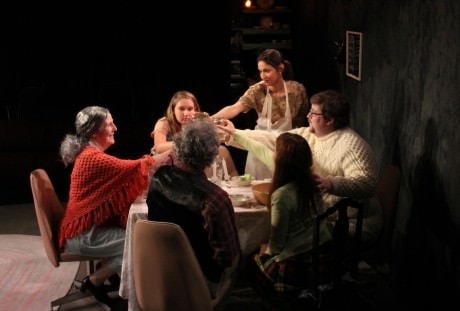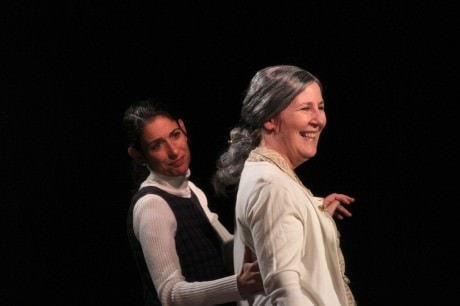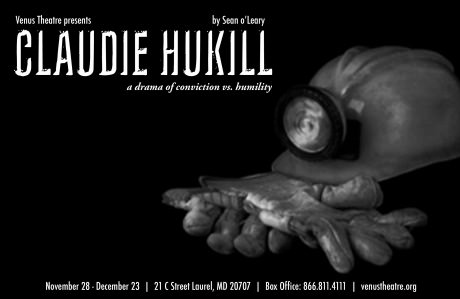Every small town has a small town hero. And for every small town hero there’s bound to be some family secrets that go along with him. Of course in a small town they probably aren’t as secret as the family would like to think. And when the light of day shines down on the darker side of things a truth will come out that will shake everything up. That’s the sort of story you’re buying into when you attend Venus Theatre’s production of Claudie Hukill. Written by Sean O’Leary and directed by the theatre’s founder Deborah Randall, this story becomes a drama of conviction verses humility.

Set in a holler just outside of Logan County, West Virginia along the Buffalo Creek, the play is meant to take us back to 1972. There are no particular visual cues from the set or costuming that elude to this. Set Designer Amy Rhodes chooses to focus more on the impoverished culture of the region, detailing the derelict shack with thread bear carpeting and worn furniture. The literary cues are present, however, balancing out this design choice with mention of miner’s rights and segregation.
The story revolves around Claudie Hukill, a man who is never physically present on the stage, but is talked about and addressed enough that you feel he’s been there all along and could come waltzing into the very next scene. His heroic deeds — be they selfish and irresponsible or truly heroic — are the center of the conflict when his wife starts struggling, his mother goes blind, and his brother comes back to town. Wrapped around the central concept of man’s nature vs. heroism, tangled up in a conflict of conviction and humility the plot delves deep into the human psyche to determine where the lines between right and wrong truly lie.
Playwright Sean O’Leary’s work is best described as verbose. He uses a lot of words to say very little and at times this causes the play to drag. Director Deborah Randall has composed moments of stunning emotional silence throughout the piece; pauses where the characters are left to stew in the presence of the ever-missing title character, which are then almost immediately drowned out by the tsunami of words that follow. O’Leary’s dialogue between characters runs on in places and is repetitive, spinning in circles for the sake of having spoken word. This inevitably causes some pacing issues with the production – but despite the difficult text the performers are able to wrangle deep levels of emotional growth from it.
The other bit of this production that falls just slightly off-key is the use of the accents. Grandma who has lived there all her life has no West Virginia, nor any other kind of sound, to her voice at all. Pearl and Kit sound particularly southern with a yokel slang approach to their voices and Rob, the brother who fled to Boston nearly a decade ago, has neither a West Virginia accent or a Boston accent. But the winner of the confusing accent accomplishment trophy is Tierney (Katie Jeffries) – starting off with an upper-crust New England accent and then muddling down into something southern. This was just a plucky nuisance that set the show slightly off-balance but otherwise did not derail it.

The acting was superior, a forceful effort coming from the full company of six to really draw emotions from the palaverous text. Sam Burton (Rick Coleman) appearing the least on the stage of the ensemble, makes his presence known with his simple but profound speeches and interactions with the characters. Coleman acts as the ‘motivation’ in places, moving the script along for movements sake without appearing contrived in his efforts of doing so.
Harlie Sponaugle (Grandma Clara) gives a thorough portrayal of a blind woman. She never loses sight of her character’s lack of vision, constantly staring off at one fixed point when addressing those in the room, stumbling a bit as her blindness is a recent addition to her life but not so recent that she should be completely off-kilter. Sponaugle is reserved in her emotions until the climax of the play, letting loose a world of fear and upset that comes spiraling out in a deluge of near-tears.
Tierney (Katie Jeffries) and Rob (Chris Williams) slide into the scene as the outsiders. Coming down from Boston they try to fit into the family chaos, Jeffries, who married into the family, doing a much easier job of it than Williams, who was born into it. The pair have all the chemistry and bickering that a newlywed couple should, with Jeffries leaning to the sympathetic side of her character and Williams leaning more toward the pigheaded side of his. Williams’s confrontations in regards to his absent brother are harsh, a progressive anger and frustration that builds and builds until he finally lets loose, both verbally and physically, unloading upon all who will listen.
The diamonds in the coal dust sparkle from Kit (Rebecca Korn) and Pearl (Alyssa Sanders). Both having mastered the West Virginia accents this mother and daughter pair really extricate every last drop of emotional turmoil and conflict that there is to be had from this play. Korn, constantly disappearing to go and be with her daddy, is a whip-smart little girl with a burning passion to do what’s right buried beneath her filthy exterior. Looking ever the child of a coal miner’s daughter, Korn acts as both the voice of reason and the voice of justice throughout the production and is a key element in the evolution of the story’s plot.
Sanders attempts to hold down the fort and keep everything together. Her frustration and desperation is exemplary in its execution; holding everything back until the last moment and then letting loose like a mad dog, barked with fear and concern haunting her voice. Her emotional expressions are raw and grounded in true trauma, scared for her daughter, scared for her husband; all condensed into one powerful performance that will leave your heart breaking for her plight. She carries a tremendous emotional burden throughout the show, releasing it bit by bit until the show’s final conclusion; a performance well-worth seeing.
Running Time: Two hours and 30 minutes, with one intermission.
Claudie Hukill plays through December 23, 2012 at The Venus Theatre Playshack – 21 C Street in Laurel, MD. For tickets, call the box office at (202) 236-4078 or purchase them online.





